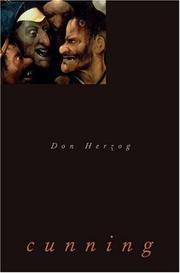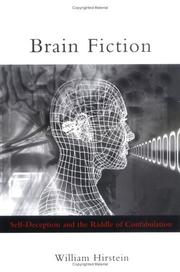| Listing 1 - 4 of 4 |
Sort by
|

ISBN: 0691124159 0691136343 9786612157202 1282157205 140082706X 9781400827060 9780691136349 9780691124155 9780691136349 Year: 2006 Publisher: Princeton Princeton University Press
Abstract | Keywords | Export | Availability | Bookmark
 Loading...
Loading...Choose an application
- Reference Manager
- EndNote
- RefWorks (Direct export to RefWorks)
Want to be cunning? You might wish you were more clever, more flexible, able to cut a few corners without getting caught, to dive now and again into iniquity and surface clutching a prize. You might want to roll your eyes at those slaves of duty who play by the rules. Or you might think there's something sleazy about that stance, even if it does seem to pay off. Does that make you a chump? With pointedly mischievous prose, Don Herzog explores what's alluring and what's revolting in cunning. He draws on a colorful range of sources: tales of Odysseus; texts from Machiavelli; pamphlets from early modern England; salesmen's newsletters; Christian apologetics; plays; sermons; philosophical treatises; detective novels; famous, infamous, and obscure historical cases; and more. The book is in three parts, bookended by two murderous churchmen. "Dilemmas" explores some canonical moments of cunning and introduces the distinction between knaves and fools as a "time-honored but radically deficient scheme." "Appearances" assails conventional approaches to unmasking. Surveying ignorance and self-deception, "Despair?" deepens the case that we ought to be cunning--and then sees what we might say in response. Throughout this beguiling book, Herzog refines our sense of what's troubling in this terrain. He shows that rationality, social roles, and morality are tangled together--and trickier than we thought.
Bedriegerij --- Bedrog --- Chicanery --- Deceit --- Deception --- Listen --- Misleiding --- Ruses --- Subterfuge --- Tromperie --- Deception. --- Truthfulness and falsehood --- Intrigue

ISBN: 0262083388 0262582716 9786612098536 1282098535 0262275473 142379656X 0262311585 9780262275477 9781423796565 9780262083386 9781282098534 9780262582711 Year: 2005 Publisher: Cambridge, Mass. : MIT Press,
Abstract | Keywords | Export | Availability | Bookmark
 Loading...
Loading...Choose an application
- Reference Manager
- EndNote
- RefWorks (Direct export to RefWorks)
Includes information on amnesia, anosognosia, Anton's syndrome, autism, Capgras' syndrome, Cotard's syndrome, denial, emotion, Fregoli's syndrome, hypothalamus, Korsakoff's amnesia, Korsakoff's syndrome, limbic system, lying, memory, mirror image syndome, orbitofrontal cortex, etc.
Philosophical anthropology --- Pathology --- Psychology --- Deception. --- Self-deception. --- Mythomania. --- Tromperie --- Déception de soi --- Mythomanie --- Déception de soi --- Lying --- Pseudologia phantastica --- Chicanery --- Deceit --- Subterfuge --- Forensic psychology --- Psychology, Pathological --- Truthfulness and falsehood --- Deception --- Defense mechanisms (Psychology) --- Self-perception --- Intrigue --- COGNITIVE SCIENCES/General --- COGNITIVE SCIENCES/Psychology/Cognitive Psychology

ISBN: 0521643228 9780521643221 9780511483028 9780521028714 052102871X 1107116562 0511174136 0511066252 0511059949 0511328036 0511483023 1280417536 1139145983 0511068387 9780511066252 9780511059940 9780511068386 6610417539 9786610417537 Year: 2000 Publisher: Cambridge : Cambridge University Press,
Abstract | Keywords | Export | Availability | Bookmark
 Loading...
Loading...Choose an application
- Reference Manager
- EndNote
- RefWorks (Direct export to RefWorks)
This book, first published in 2000, is a full-length study of the representation of deceit and lies in classical Athens. Dr Hesk traces the ways in which Athenian drama, democratic oratory and elite prose-writing construct and theorize a relationship between dishonesty and civic identity. He focuses on the ideology of military trickery, notions of the 'noble lie' and the developing associations of rhetorical language with deceptive communication. Deception and Democracy in Classical Athens combines close analysis of Athenian texts with lively critiques of modern theorists and classical scholars. Athenian democratic culture was crucially informed by a nuanced, anxious and dynamic discourse on the problems and opportunities which deception presented for its citizenry. Mobilizing comparisons with twentieth-century democracies, the author argues that Athenian literature made deception a fundamental concern for democratic citizenship. This ancient discourse on lying highlights the dangers of modern resignation and postmodern complacency concerning the politics and morality of deception.
CIVILIZAÇÃO GREGA (POLÍTICA). --- DEMOCRACIA --- Deception --- Deception. --- Democracy --- Democracy. --- Democratie. --- Demokratie. --- Déception (science militaire) --- Déception. --- Démocratie --- Griekse oudheid. --- Misleiding. --- Rhetorik. --- Tromperie --- Täuschung. --- Athen. --- Athens (Greece) --- Athènes (Grèce) --- Greece --- Griechisch. --- History. --- Politique et gouvenement. --- -Democracy --- -Self-government --- Political science --- Equality --- Representative government and representation --- Republics --- Chicanery --- Deceit --- Subterfuge --- Truthfulness and falsehood --- Intrigue --- Self-government --- Arts and Humanities --- History
Book
ISBN: 1575066424 9781575066424 9781575062198 1575062194 Year: 2011 Publisher: Winona Lake : Eisenbrauns,
Abstract | Keywords | Export | Availability | Bookmark
 Loading...
Loading...Choose an application
- Reference Manager
- EndNote
- RefWorks (Direct export to RefWorks)
What role does God play in relation to the deceptions that pervade the Jacob cycle? What has not been investigated is the way God may factor into this deceptive activity. The book of Genesis contains a latent tension: Jacob is both a brazen trickster who deceives members of his own family and YHWH's chosen, from whom the entire people of Israel derive and for whom they are named. How is one to reconcile this tension? This dissertation investigates the phenomenon of divine deception in the Jacob cycle (Gen 25-35). The primary thesis is that YHWH both uses and engages in deception for the perpetuation of the ancestral promise (Gen 12:1-3), giving rise to what Anderson has dubbed a theology of deception. Through a literary hermeneutic, emphasizing the symbiotic relationship between both how the text means and what the text means, with theological aims, this study examines the various manifestations of YHWH as Trickster in the Jacob cycle. Attention is given to how the multiple deceptions evoke, advance, and at times fulfill the ancestral promise. In Gen 25-28 YHWH engages in deception to insure Jacob receives the ancestral promise. Here Jacob is seen cutting his deceptive teeth by extorting the right of the firstborn from Esau and the paternal blessing from Isaac. YHWH, however, also plays the role of Trickster through an utterly ambiguous oracle to Rebekah in Gen 25:23, which drives the human deceptions. At Bethel (Gen 28:10-22) Jacob receives the ancestral promise from YHWH, in effect corroborating the earlier deceptions. In Gen 29-31 YHWH uses the many deceptions perpetrated between Jacob and Laban to advance the ancestral promise in the areas of progeny, blessing to the nations, and land. Lastly, in Gen 32-35 YHWH participates in Jacob's final deception of Esau (Gen 33:1-17) through two encounters Jacob has, first with the "messengers of God" and second with God. Jacob's tricking of Esau during their reconciliation results in Jacob's return to the promised land. Can anyone out-trick the Divine Trickster? Anderson thus rightly gives due attention to the Old Testament's image of God as dynamic, subversive, and unsettling, appreciating the complex and intricate ways that YHWH interacts with his people. This witness to YHWH's engagement in deception stands alongside and informs the biblical portrait of YHWH as trustworthy and a God who does not lie.
Deception in the Bible. --- Truthfulness and falsehood --- Religious aspects --- Judaism. --- Bible. --- Be-reshit (Book of the Old Testament) --- Bereshit (Book of the Old Testament) --- Bytie (Book of the Old Testament) --- Chʻangsegi (Book of the Old Testament) --- Genesis (Book of the Old Testament) --- Sifr al-Takwīn --- Takwīn (Book of the Old Testament) --- Criticism, interpretation, etc. --- Verite et mensonge --- Deception --- Aspect religieux --- Judaïsme. --- Enseignement biblique. --- Jacob, --- Critique et exegese. --- Chicanery --- Deceit --- Subterfuge --- Intrigue --- Désappointement --- Désillusion --- Désenchantement --- Émotions --- Contrevérité --- Crédibilité --- Fausseté --- Faux (morale) --- Insincérité --- Mensonge --- Menterie --- Véracité --- Vérité (morale) --- Vrai (morale) --- Authenticité --- Confiance --- Détecteurs de mensonge --- Divulgation d'informations --- Faux --- Mythomanie --- Vérité --- Vérité et mensonge --- Calomnie --- Fact-checking --- Flatterie --- Hypocrisie --- Post-vérité --- Sincérité --- Tromperie --- Vantardise --- Morale pratique --- philosophie --- droit pénal --- Chez l'enfant --- Israël --- Jacob
| Listing 1 - 4 of 4 |
Sort by
|

 Search
Search Feedback
Feedback About
About Help
Help News
News